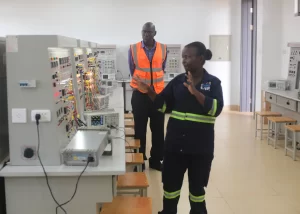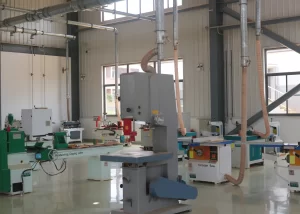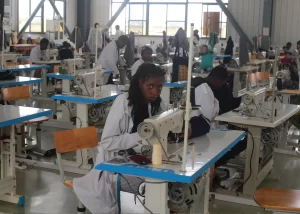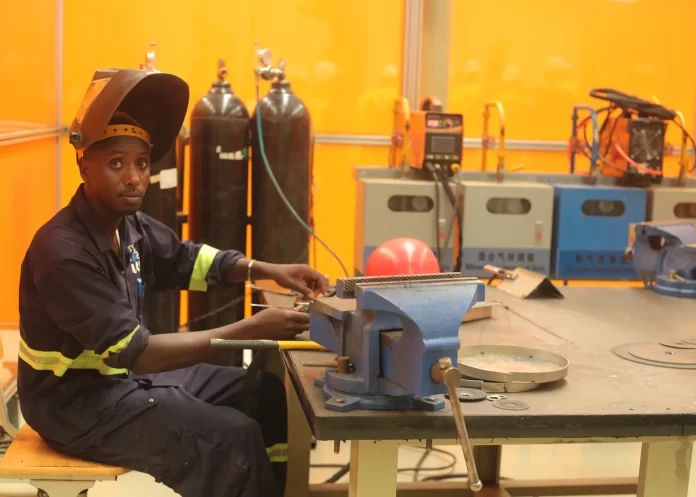A student of Engineering from Makerere University is at the final stage of developing an unmanned aircraft system, also known as a drone at the Uganda Industrial Research Institute (UIRI), a government centre of Excellence with competence and capability that champions innovations.
Established in 2002 by an Act of Parliament, UIRI provides a centre for technological research and innovations that translate into practical applications and can lead to high-quality, efficient industrial products and processes and create highly skilled human resources.
Currently, several students of Engineering drawn from different Universities and Tertiary Institutions across the country, including the one from Makerere University who is manufacturing the drone, are undergoing industrial training to fine-tune their skills before they can graduate or complete their training.
While taking the Nexus Media team on guided tour of the institution in Namanve also known by residents there as China Aid, Eng. David Ilukol, the Head of Engineering at UIRI, said that the manufacturing of the drone has reached its final stage and will soon be completed.
He added that, the unmanned aircraft is being manufactured using local materials, and once completed, it will be tested to ascertain its effectiveness, among other things, before its production can be escalated.
Eng. Ilukol said that trainees are usually taken through vigorous lessons by excellent tutors that are exposed to modern technologies to help students improve on their innovations.
“We have various units where trainees are engaged to expose them to the latest technologies to build their skills and Innovations. We have electrical, tailoring and garments, carpentry, among others,” said Eng. Ilukol.
Printed Circuit Board (PCB) Technology is one of the technologies being promoted at UIRI and according to Eng. Ilukol, learners are exposed to modern electrical systems that are based on the use of electronic components and circuits with the capability to perform programmable logic operations.
He says Printed Circuit Board (PCB) technology enables high-precision, high-volume production of reliable electronic circuits for a wide range of products.
“All electronic products (from calculators to computers) are currently imported, yet some of these could be manufactured locally affordably. Accordingly, the introduction of PCB technology is expected to lay the foundation for a local electronics industry, leading to import substitution,” Eng. Ilukol said.
According to Eng. Ilukol, UIRI is also promoting Bamboo Processing Technology with the intention of developing innovations that will allow use of bamboo resources to produce a range of high-value bamboo products, including mats, textiles, carpets, floor boards, curtains, car seat covers, and decorative ornaments, and bicycles among others.

He said this particular innovation is being promoted by UIRI in collaboration with the China Bamboo Research Centre (CBRC), and some staff have been trained in all aspects of bamboo value addition and acquired processing technology for the production of toothpicks.
UIRI is also promoting Hand-Made Paper Technology following the 2007 Presidential directive to UIRI’s Executive Director, Prof. Charles Kwesiga, to develop affordable biodegradable paper packaging materials.
Eng.Ilukol said this particular technology was introduced to support government policy to ban the use of non-biodegradable colored low-density polyethylene bags of 30 microns or less, commonly known as Kaveera.
He noted that through this technology, a variety of products have been produced, including shopping bags, gift bags, envelopes, invitation cards, calendars, dairies, notebooks, file covers, and art paper, using natural fibres such as banana stems, sisal, cotton linter, papyrus, bagasse, pineapple leaves, recycled paper, and cotton rugs.

In a move to promote affordable poultry products through the use of modern hatcheries, the institute has undertaken a project to design, construct, and test a semi-automated hatchery under the technology codenamed “Hand Hatchery Design and Construction.
Eng. Ilukol said the capacity of the prototype currently being tested is ideal for use at the household chicken farmer level, adding that the unit is designed to incubate batches of 500–600 eggs and has the potential to contribute considerably to rural poultry farming, particularly since its power requirements are modest and it can be operated by a small generator.
Gloria Kyampeire, the Senior Communication Officer at UIRI, listed some of the technologies that are being promoted at the Uganda Industrial Research Institute as the Silk Processing Project, Weaving Technology Project, Multi-Nutrient Animal Feeds Project, Small-Scale Natural Soap Processing, and Cow Horn Utilisation.
“UIRI strives to undertake applied research and to develop and or acquire appropriate technologies in order to create a strong, effective, and competitive industrial sector in Uganda and to catalyse the socio-economic transformation of Uganda and the region through enhanced technology use,” she said.

Prof. Charles Kwesiga, the Executive Director of UIRI, who welcomed the Nexus Media team to the institute, said that Uganda can only achieve industrial expansion with the right technologies.
“The technology needs of developing countries like Uganda can, in many instances, be addressed by acquiring technologies from developed countries and adapting them for local application,” Prof. Kwesiga said.
Recently, while meeting a group of scientists at State House Entebbe, President Yoweri Kaguta Museveni emphasized the government’s commitment to avail adequate funding to support technologies and innovation in the country. With an institute like UIRI which is dedicated to build capacity in terms of technology and practical skills offered to Engineering students, Uganda is on a self-dependent trend in terms of production.















